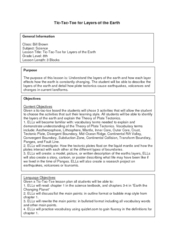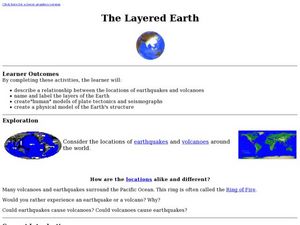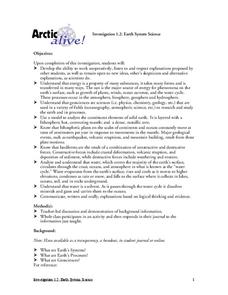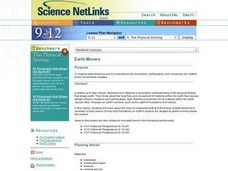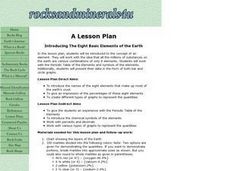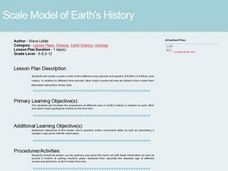GNS Science
Think like a Geologist: 1
How well do pupils play the role of geologist? Test their abilities in the first installment of a two-part series. Presented with a series of rock formation diagrams, learners write stories to match what they see in the diagrams. The...
Science Matters
A Model of Plate Faults
The San Andreas fault is one of the longest fault zones in the world. In a series of 20 lessons, the fourth lesson has pupils use a paper model to recreate various types of plate faults. Each is held in position then drawn into a science...
Curated OER
Volcanoes
Students participate in groups to complete a volcano project. In this volcano instructional activity, students work in groups to follow directions and create a working, model volcano. Students then answer discussion questions about their...
Curated OER
Earth Science - Earth's Atmosphere
Students build an understanding of the dynamics and composition of the atmosphere and its local and global processes influencing climate and air quality. They analyze global atmospheric changes including changes in CO2, CH4, and...
Curated OER
Tic-Tac-Toe for Layers of the Earth
Eighth graders identify the different layers of the earth. In this earth science instructional activity, 8th graders choose a project to do from a given list according to their learning style. They present their finished project in class.
Curated OER
What Makes Up Earth's Surface?
In this Earth's surface worksheet, students complete a graphic organizer by writing 1 main idea and 7 supporting details about what makes up the Earth's surface.
Curated OER
What is the Earth's Surface Like?
In this Earth's surface worksheet, students complete a graphic organizer by writing in 1 main idea and 4 supporting details describing the Earth's surface.
PHET
CME Plotting
Young scientists build on their previous knowledge and apply it to coronal mass ejections. By plotting the path of two different coronal mass ejections, they develop an understanding of why most don't collide with Earth.
Space Awareness
Ocean Acidification
Learn the science behind ocean acidification and its effects on ocean wildlife. Young scientists conduct a laboratory investigation that monitors the acidity level of water. While burning a candle, learners capture the carbon dioxide in...
Curated OER
What is Soil?
Students examine soil. In this earth science lesson, students define and describe weathering and erosion as it relates to soil. Students compare and contrast potting soil with forest soil and complete a science observation worksheet.
Curated OER
Changing Crust
For this changing crust worksheet, students use candy bars, licorice sticks and bubble gum to simulate the 3 types of forces that change the Earth's crust. These include compressional forces, tensional forces and transversal forces. The...
Curated OER
The Layered Earth
Learners role play plate tectonics by creating a "plate statue" made up of students. In this earth science lesson, learners describe how Earth's movement cause earthquakes and volcanoes. They draw and name the different layers of the Earth.
Curated OER
Stratigraphy -- Layers of Time in the Earth
Students are introduced to the process of stratification. Using the internet, they read about the Richard Beene archeological site near San Antonio. Using a map, they color code the different layers present at this site and answer...
Curated OER
Seafloor Spreading
In this seafloor spreading worksheet, students use 12 given terms to complete sentences about the layers of the Earth and the components of the layers of the Earth.
Curated OER
Earth System Science
Students explore the Earth and its ability to support life. They discuss the geosphere and the water cycle and complete the Water Wonders activity. After completing the activity, they respond in their journals and reflect upon the...
Curated OER
Science Quiz: Earth Quiz
In this earth science quiz worksheet, students respond to 20 short answer and true or false questions regarding earth science topics.
Curated OER
Earth Movers
Students read an online article about an earthquake and follow up with a series of discussion questions about earthquakes. They answer questions in their science journals about continental drift, plate tetonics, and their influence on...
Curated OER
Earthquake Science Project
Students simulate the Earth's plates moving like an earthquake by using newspaper and soil. In this earthquake lesson plan, students push and pull the newspaper together that has soil on top and observe what happens.
Curated OER
Understanding the Layers of the Earth
Fourth graders explore the three layers of the Earth describing the composition, thickness, and temperature of each layer. Layers are compared and contrasted and data unearthed placed into graphic organizers.
Curated OER
Eight Basic Elements of the Earth
Students identify the concept of an element and work with an idea that all of the millions of substances on the earth are various combinations of only 8 elements. They work with the Periodic Table of the Elements and symbols of the...
Curated OER
A Scale of the Earth
Students create a scale model of the different eras, periods, and epochs of Earth's 4.6 billion year history. In addition to different time periods, other major events will also be added to the model from fabricated radioactive decay...
Curated OER
Using Satellite Imagery to Discuss the Science Behind Brazilian Deforestation
Students can delve into earth science by using satellite imagery to learn about the deforestation of the Brazilian rainforest.
Curated OER
Structure of the Earth
Sixth graders examine the layers of the Earth and the changes that take place on a daily basis. They look at the layers of a boiled egg to relate them to the layers of the Earth.
Curated OER
Styrofoam Earth
Young scholars examine how there are three layers inside the Earth. They design their own model of the layers of the Earth with a Styrofoam ball. They illustrate the layers inside the Earth with crayons.






